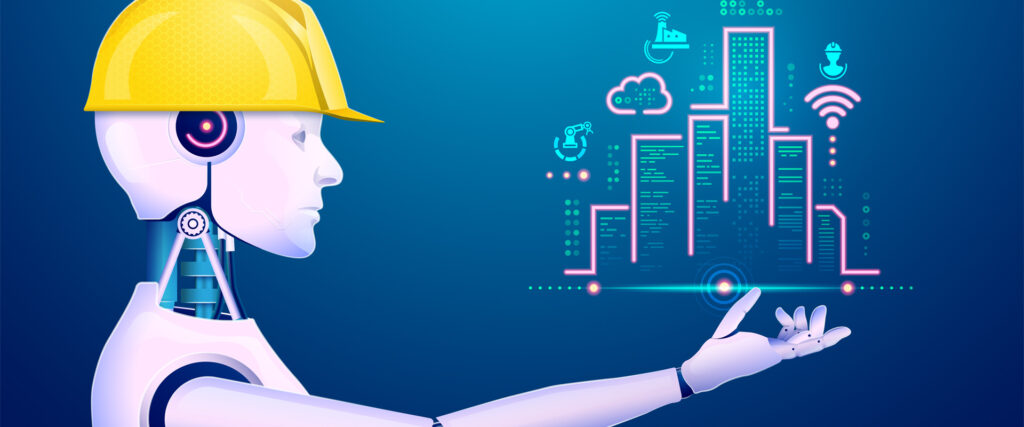The impact of Artificial Intelligence in the Construction Industry

It is no secret that technology has changed the landscape of all industries. Artificial Intelligence as a whole has been widely acknowledged as an ever-advancing technology; it now permeates nearly all industries including revolutionising the Construction sector to make work less strenuous and more proactive.
Just think about what happens during construction projects – design takes time, construction is risky, everything can go wrong at any given point in time – but there is still the need for repetitive tasks that take up a lot of time, like pouring concrete or slowly feeding pieces of metal into press machines. This is exactly where artificial intelligence comes in.With the help of AI, tasks like pouring concrete can be done by an autonomous construction machine that works independently knowing precisely what to do. That way there is less time spent on manual labour and more time to focus on other aspects of the construction project that can be easily automated.
Here’s the bigger picture –
According to Business Wire, “The global construction industry is expected to reach an estimated $10.5 trillion by 2023, and it is forecast to grow at a CAGR of 4.2% from 2018 to 2023.”
Another report by All the Research states that “The Global Artificial Intelligence in Construction Market was valued at USD 0.4 Bn in 2020 and is expected to reach USD 3.5 Bn by 2027, with a growing CAGR of 36.5% during the forecast period (2021-2027).”
These facts clearly show the rate at which modern infrastructure is progressing and how the sector is welcoming the recent tech.
Are you late to the race?
Construction may be one of the oldest industries but it still has a long way to go when it comes to accepting new technology. This industry-wide reluctance for change can be explained in either of the two ways:
First, the fear of the unknown among professionals that holds them back from experimenting with new technology. Second, limited resources for research and development.
Now, it doesn’t matter if you are a building material manufacturer or a construction company, advanced tech can prove to be of much value at various points in your business.
Although the construction sector had been among one of the slowest adopters of AI-powered technology, a major boost in its usage could be seen from 2016. This late yet smart move has started disrupting the traditional practices and processes throughout the value chain making it more productive.
AI applications in the construction sector
Be it gaining predictive insights or robots laying bricks, AI has proven to be impactful at various levels of operations. Here are some examples:
- 3D Modelling – During the initial phases, AI-enabled frameworks and software are being used to construct the structure and internal components of a building in a computerised 3D format. These models provide valuable insights to architects, engineers, and builders so they can plan and design more efficiently.
- Construction management software – Another astonishing AI-powered technology that helps monitor workers’ performance and increases on-site safety. By analysing the previous data, the algorithm can raise issues and assign the right person to fix them as well.
- Image recognition Systems – Scanning and mapping a construction site from the comfort of your office desk is not a dream now. An AI site inspector can provide pictures and videos of the live construction site to track the status of the project.
- Chatbots – Certain business processes are automated through computer software that can engage in meaningful conversations with people while providing them adequate solutions to their queries.
The Benefits:
- Informs about potential problems in advance and reduces risks through predictive analysis of past data.
- Manages cost overruns by suggesting better alternatives.
- With the correct employee data, AI can automate delegating tasks by analysing their skills and experience.
- Improves workspace safety by delivering accurate information and conclusions.
Let’s have a look at the barriers:
- An expensive affair – Installation and maintenance is costly but with proper resource allocation you can get impressive output.
- Lack of creativity – Although AI can’t perform tasks outside of their programming, it is evolving continuously and we may see these upgrades soon.
- Risk of unemployment – Robots may replace most humans but not all. A machine will always require a human to operate and run it. Instead, this can create other job opportunities.
- Depreciation – Wear and tear can be risky but it can also be prevented with good maintenance and care.
Every industry including the Construction sector has seen a dramatic shift toward AI recently Whether we’re talking about drones flying over site to programmed machines that deliver accurate results, it seems like AI has left no stone unturned. However, as machines can’t think for themselves, they cannot replace humans…yet!
